THX 1138 Blu-ray Movie
HomeTHX 1138 Blu-ray Movie 
The George Lucas Director's CutWarner Bros. | 1971 | 89 min | Rated R | Sep 07, 2010
Movie rating
7 | / 10 |
Blu-ray rating
| Users | 4.9 | |
| Reviewer | 4.0 | |
| Overall | 4.0 |
Overview
THX 1138 (1971)
THX 1138 leads viewers into a 25th-century totalitarian state where citizens are stripped of individuality and become numbered drones, controlled by a government-enforced program of sedating drugs. THX 1138 is a factory worker whose life is irrevocably changed when his roommate, LUH 3417, causes them both to stop taking their drugs. Their feelings begin to awaken and lead to a forbidden love affair. The state discovers the illegal coupling and drug evasion and separates THX and LUH. But THX is determined to flee his wall-less prison and discover LUH's fate. To do so, he must avoid the robotic police force and unknown dangers of the outside world.
Starring: Robert Duvall, Donald Pleasence, Don Pedro Colley, Maggie McOmie, Ian WolfeDirector: George Lucas
| Drama | Uncertain |
| Sci-Fi | Uncertain |
| Mystery | Uncertain |
| Thriller | Uncertain |
Specifications
Video
Video codec: VC-1
Video resolution: 1080p
Aspect ratio: 2.34:1
Original aspect ratio: 2.35:1
Audio
English: DTS-HD Master Audio 5.1 (48kHz, 24-bit)
French: Dolby Digital 5.1 (640 kbps)
German: Dolby Digital 5.1 (640 kbps)
Spanish: Dolby Digital 5.1 (640 kbps)
Subtitles
English SDH, French, German SDH, Spanish, Danish, Dutch, Finnish, Norwegian, Swedish
Discs
50GB Blu-ray Disc
Single disc (1 BD)
Playback
Region free
Review
Rating summary
| Movie | 4.0 | |
| Video | 4.0 | |
| Audio | 4.0 | |
| Extras | 4.0 | |
| Overall | 4.0 |
THX 1138 Blu-ray Movie Review
"Thou art a subject of the divine, created in the image of man, by the masses, for the masses."
Reviewed by Kenneth Brown September 5, 2010CG killed the filmmaker. At least in the case of George Lucas. Watching THX 1138, Lucas's 1971 feature-length film debut, it's clear that character and story were once far more important to the Maker than Gungan land wars and Kaminoan clone facilities. Lucas has always fancied himself a world-weaver, but a long time ago, in a galaxy far, far away, his worlds were more tangible, more evocative, more intriguing, more... meaningful. Even with its polished, 21st century Director's Cut makeover, THX 1138 isn't about the dystopian future Lucas's oppressed and repressed populous inhabit, it's about a man who awakens from a walking coma, discovers his humanity and takes his fate into his own hands. It isn't groundbreaking science fiction, but it is science fiction done well; a finely tuned medley of still-relevant satire and arresting drama. It isn't a timeless classic, but it is an unnerving, thought-provoking cautionary tale; a haunting indictment of psychotropic drugs, Orwellian groupthink, socio-political propaganda, and the forfeiture of fundamental rights. Sound vaguely familiar? It should.
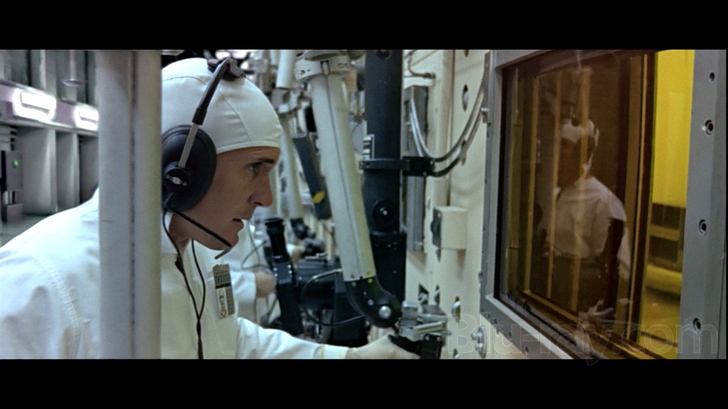
"Let us be thankful we have an occupation to fill. Work hard, increase production, prevent accidents and be happy."
On its surface, THX 1138 offers a simple dystopian tale set in an unnamed, underground city in the not-so-distant (or perhaps-quite-distant) future. Though under constant surveillance, the city's inhabitants are required to take mind-altering narcotics that suppress their emotions and desires, and are forbidden to pursue sexual relationships. Law and order is maintained by androids built in human-run factories, and religious belief is centered on a disembodied, seemingly omnipresent man-made deity dubbed OMM 0910. That all changes though when a female surveillance operator named LUH 3417 (Maggie McOmie, in her first and only feature-film role) decides to go off her meds. Overcome by a surge of foreign feelings, she takes her rebellion one step further and secretly replaces her male roomate's pills with placebos. Her roommate, a factory worker named THX 1138 (Robert Duvall), experiences a similar reaction, and immediate gravitates to the one person who understands the emotions flooding his body and mind: LUH 3417. Whether by love, lust or some intoxicating mixture of both, THX and LUH consummate their ideological marriage and forge a dangerous relationship, one that forces Lucas's lovers to choose either mental or physical imprisonment, state-sanctioned conformity or illegal happiness, and comfortable ignorance or the harsh unknown. It isn't exactly red-pill, blue-pull, but you get the idea.
THX 1138 has two distinct heartbeats: its at-times minimalistic, at-times vulnerable performances and Walter Murch's disquieting sound design. The former comes courtesy of Duvall, McOmie and Donald Pleasence (who plays SEN 5241, THX's soapbox-mounting cellmate in the city's eerie Limbo prison), a trio of fine actors who give their all, hair included, in service of Lucas's monochromatic dreamscape. The latter is a dissonant cacophony of computer beeps, ominous radio chatter, bursts of static, mechanical murmurs, OMM's instructions, effect-driven musical tones and more, all orchestrated in a manner befitting the Orwellian nightmare that unspools out of Lucas's pocket. Both the performances and the sound design propel the film along, infusing soul into a world devoid of humanity and filling maddening silence with a spine-tingling symphony of ordered chaos. The two work in tandem to illuminate the themes at the center of the film, as well as the subtle and not-so-subtle symbolism integrated into the underground city and OMM's rituals. There are moments when the loud-speaker voices' incessant chatter, Lucas and Murch's future dystopia jargon, and SEN's spittle-flinging philosophy threaten to overwhelm THX and LUH's plight with meaningless gobbledygook, but there's a definite method to the filmmakers' madness, and it makes their world all the more interesting.
Debate has raged for six years now as to whether or not Lucas should have tampered with his original cut of the film. For the record though, the vast majority of alterations Lucas makes are far from distracting, and only one -- an extension of THX's run-in with a pack of underground, shadow-cloaked, mutants -- proves to be a disruption (and a somewhat unnecessary one at that). Otherwise, we're not talking about Greedo shooting first, Jabba slugging his way across a hangar bay, that god-awful song at the beginning of Return of the Jedi or anything of the sort. No, this is more akin to the slight snips and inoffensive bits that grace the redux of The Empire Strikes Back. An extended background here, an expanded factory there, an enhanced car escape for good measure... all courtesy of carefully employed CG. (Most people won't even notice 80% of the actual changes Lucas made to his original cut.) Would including both versions of the film help quell the outcry of purists? Definitely. For the life of me, I can't figure out why Lucas hasn't tapped into the wonders of seamless branching to do just that with all of his controversial re-releases. Be that as it may, the uproar over the THX 1138 Director's Cut is fueled more by lingering Star Wars angst and hyperbole-tainted principle than any legitimate cause for concern. Ahem... in my humble opinion, of course.
Whether or not you shrug your shoulders or froth at the mouth whenever Lucas brandishes his CG pen, it's easy to appreciate the artistry and resonance of THX 1138, regardless of the cut you're exposed to. Duvall and McOmie deliver excellent performances, the story is smart dystopian science fiction, and the world Lucas weaves -- a world of barren walls, endless prisons, icy order, steel-faced authority, and Murch's unsettling sound design -- is both fascinating and, to my surprise, more relevant than ever. THX isn't going to blow anyone's mind, nor is it a time-honored masterpiece, but at the very least, it deserves a fair chance.
THX 1138 Blu-ray Movie, Video Quality 
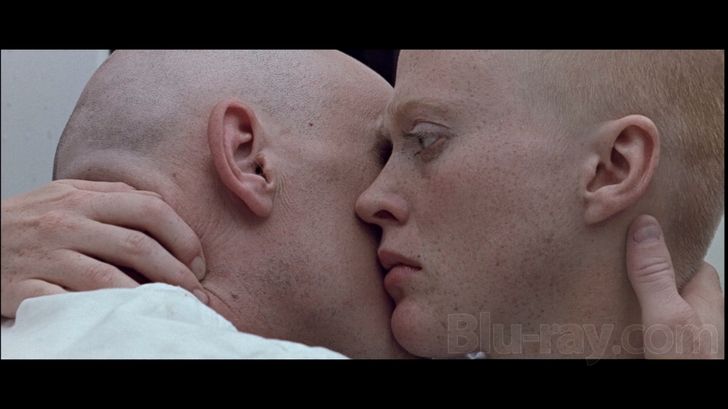
THX 1138 underwent an extensive, Lucas-supervised restoration in 2004, and the results are most impressive. The film isn't laser-sharp, nor does it look as if it were produced yesterday, but it does look far better than its thirty-nine years suggest, and even holds its own against more recent, high profile catalog overhauls. David Myers and Albert Kihn's sterile photography is both startling and striking; its eerie white spaces and fittingly oppressive shadows a testament to their commitment to Lucas's intricate simplicity. Skintones are rightfully pale but incredibly lifelike, contrast is relatively strong and stable (for a film of its age), and the few brief bursts of primary brilliance that grace the screen -- be it the flushed cheek of an anxious lover, the unsettling yellow glow of an android factory, or the piercing red lights that dot LUH's surveillance booth -- pop with precision and power. Detail is remarkable as well. While a fair amount of filmic softness is apparent throughout, particularly those scenes that take place in the Limbo prison, it hardly matters. Closeups boast some surprising textures, the film's unobtrusive grain field is intact (for the most part), object definition is quite satisfying on the whole, and delineation isn't nearly as stingy as I anticipated.
Some intermittent smearing does seem to confirm the use of scene-specific noise reduction, but since the Blu-ray edition has been minted from Lucas's hands-on restoration, I would direct any complaints to Skywalker Ranch, care of George Lucas. For better or worse, it isn't cause for alarm, and rarely distracts. Likewise, while some faint banding and negligible artifacting creep into the latter half of the third act, the rest of the presentation is as pristine as one could hope for. Print blemishes are kept to a bare minimum, and macroblocking, aberrant noise, inexplicable crush, aliasing and other anomalies aren't a factor. Ultimately, the presentation may not amount to frame-to-frame perfection, but it handily trumps its DVD counterpart and should easily please anyone armed with tempered expectations.
THX 1138 Blu-ray Movie, Audio Quality 
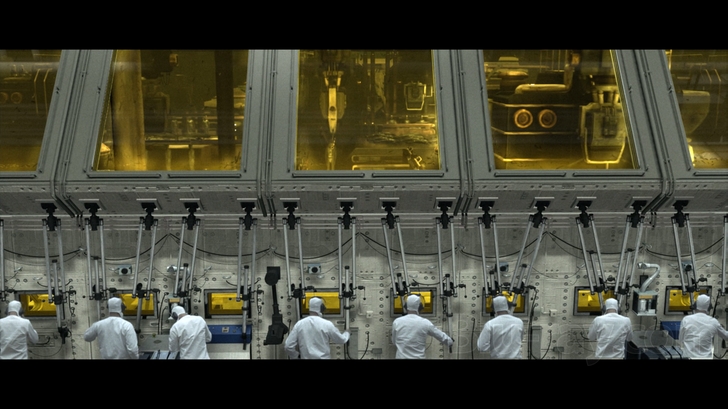
The quality of Warner's DTS-HD Master Audio 5.1 surround track isn't as readily apparent, but it's just as satisfying. Dialogue is clean, intelligible and relatively clear, and the strange, dystopian psychobabble that floods every room and hall of Lucas's underground metropolis, intentionally garbled as it is, sounds fantastic. As it stands, Walter Murch's hypnotic, altogether unnerving sound design has never been more engaging, and overcomes its humble origins and era-specific limitations to steal the sonic show. The mix still has that patented '70s timbre we've all grown to know and love, but every beep, buzz, mumble and sheen has been preserved and enhanced. Yes, voices are thin at times, almost metallic at others. Yes, LFE output and rear speaker activity is reserved, and the whole of the experience is rather front-heavy. But for a 5.1 remix of a thirty-nine-year old film, particularly one that boasts able-bodied dynamics and decent directionality, concessions should be made. Suffice to say, THX 1138 has never sounded better. While its lossless track won't exactly draw a crowd, it complements Warner's video transfer nicely and rounds out the disc's commendable AV presentation.
THX 1138 Blu-ray Movie, Special Features and Extras 
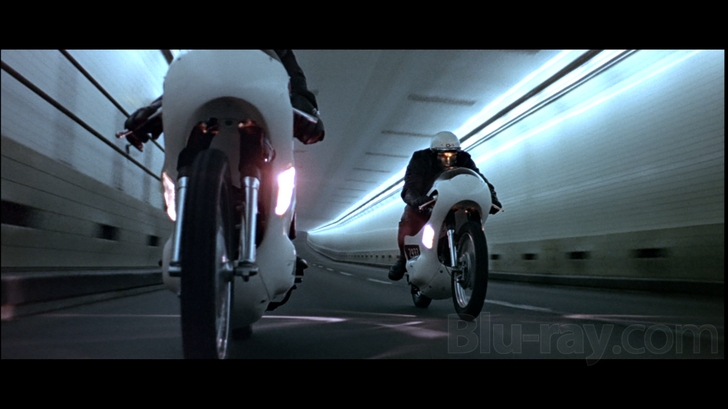
The Blu-ray edition of THX 1138: The George Lucas Director's Cut arrives with the same arresting and thorough supplemental package that adorned Warner's 2004 2-disc DVD. Yes, the content is still presented in standard definition, but with five-plus hours of pitch-perfect special features like these, it hardly matters. This is exactly the sort of treatment every catalog title of this caliber should receive.
- Audio Commentary: Co-writer/director George Lucas and co-writer/sound designer Walter Murch aren't bursting with enthusiasm or nostalgia, but their measured cadence and meticulous account of THX 1138's production is exactly what I was hoping for. Peeling back the layers of each scene, both men prove to be forthcoming speakers and storytellers, and provide a commentary worthy of any filmfan's attention. Don't pass it by.
- Master Sessions with Walter Murch (SD, 30 minutes): Murch dissects his team's sound design in thirteen scene-specific featurettes, each of which can be accessed individually from the main menu, by way of a "play all" option, or while watching the film (select the Master Sessions Experience and press enter whenever the red icon appears). Segments include "Radio Chatter Voices," "The All-Pervasive Voice," "Music as Sound Effects," "Creating Echo Effects," "Cubistic Sound in the Trial," "Torture Scene," "Music Box in the MRI Scene," "Room Tone in the Limbo Prison," "Thunder in Limbo," "Dynamic Range in the Rushing Hallway," "I Think I Ran Over a Wookie," "Jet Car Sound Effects," and "Motorcycle Sound Effects."
- A Legacy of Filmmakers: The Early Years of American Zoetrope (SD, 64 minutes): An informative, thoroughly captivating documentary about the genesis of George Lucas and Francis Ford Coppola's studio, its purpose and vision, its struggles and successes, and its influence on cinema over the years. Narrated by Richard Dreyfuss, writer/director Gary Leva's jaunt through film history features interviews with Lucas, Coppola, Steven Spielberg, Martin Scorsese, and an impressive who's who of iconic filmmakers and Hollywood masterminds.
- Artifact from the Future: The Making of THX 1138 (SD, 31 minutes): Lucas, key members of his cast and crew, and a slew of notable filmmakers examine THX 1138 and its production, wax poetic about its meaning and impact, and analyze its themes, characters and dystopian futurescape.
- Electronic Labyrinth THX 1138 4EB (SD, 15 minutes): Be sure to check out Lucas's original student film in all its low-budget glory.
- Bald (SD, 8 minutes): Completists will appreciate the inclusion of this quaint, decidedly dated vintage featurette in which the cast members get their hair sheared off.
- Breakout: Highlight the word "Commentary" in the "Behind the Story" menu and press left to access a hidden bonus: the original 2-page treatment Matthew Robbins wrote for Lucas's student film.
- Theatre of Noise Experience (HD, 88 minutes): Like the 2004 DVD, Warner's Blu-ray release offers an isolated music and effects track.
- Theatrical Trailers (SD, 14 minutes): THX 1138's original 1971 trailer and five 2004 re-release promos top off the disc's supplemental package.
THX 1138 Blu-ray Movie, Overall Score and Recommendation 
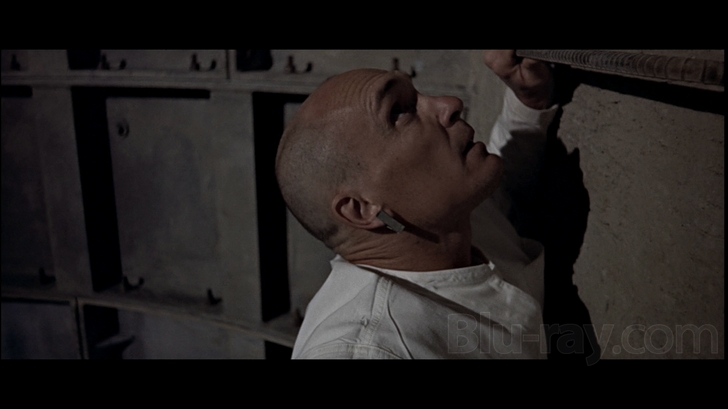
Different films appeal to different people in different ways. THX 1138 will never unite the masses, nor is it likely to leave the same lasting mark as cinema's future dystopia classics. However, it's an intelligent slice of sci-fi in its own right, and a greater testament to Lucas's talent than many of his... let's just say less-than-beloved films. Warner's Blu-ray release isn't perfect either, but that shouldn't dissuade anyone from adding it to their cart. Its video transfer is fit and faithful, its DTS-HD Master Audio track is equally commendable, and its supplemental package will keep fans busy for a good four or five hours. I don't know about you, but I already found a home for THX 1138 in my collection.
Similar titles
Similar titles you might also like

The Prisoner: The Complete Series
1968

Children of Men
2006

The Man Who Fell to Earth
Limited Collector's Edition
1976

Midnight Special
2016

Arrival 4K
2016

2001: A Space Odyssey 4K
1968

Moon
2009

The Zero Theorem
2013

The Day the Earth Stood Still
2008

The Rover
2014

Ex Machina 4K
2015

Soylent Green
1973

Young Ones
2014

The Circle
2017

Southland Tales
2006

The Parallax View
1974

A Scanner Darkly
Re-Release
2006

12 Monkeys 4K
1995

Seconds
1966

Blackhat 4K
Limited Edition
2015
